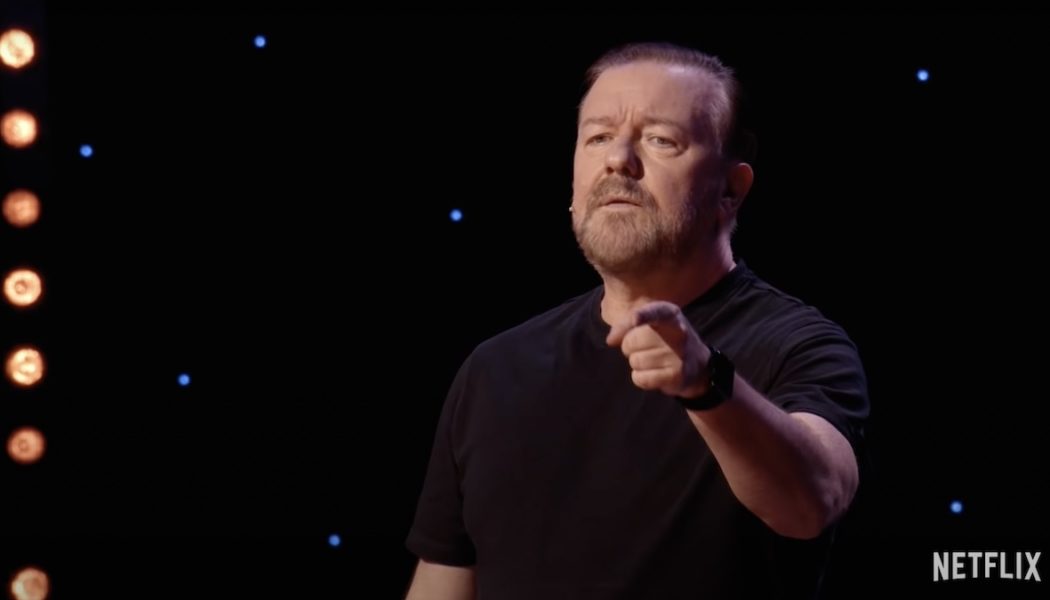Not that the current conversation about comedy, Netflix, and trans people needed a new development this month, but it got one in the form of Tuesday’s (May 24th) debut of a new Ricky Gervais special. You don’t really need to watch SuperNature on Netflix or read the recaps of his comments if you don’t want to — it’s the same strutting for attention that Gervais has executed countless times over the years, with a token attempt to say that he does believe in trans rights… well, at least, he says:
“Full disclosure: In real life of course I support trans rights. I support all human rights, and trans rights are human rights. Live your best life. Use your preferred pronouns. Be the gender that you feel that you are. But meet me halfway, ladies: Lose the cock. That’s all I’m saying.”
A message that they most likely find neither hilarious nor empowering.
As stated above, this is only the latest incident in an increasingly “us versus them” debate over what comedians can or can’t say on stage, following Dave Chappelle’s surprise appearance at a John Mulaney show (much to the dismay of trans fans who were in the audience), following no shortage of other controversies. But here is a serious question, for all of us involved in the conversation — comedians, audience, and critics — at what point did the concept of empathy become so damn hard?
A person is a person, and maybe it’s not necessary for so many comedians to weigh in about the choices or even the basic existence of those who happen to be trans. Hell, maybe in general comedians might consider the question of how their actions affect others.
Related Video
ricky gervais transphobic
” data-image-caption=”
SuperNature (Netflix)
” data-medium-file=”https://consequence.net/wp-content/uploads/2022/05/ricky-gervais-transphobic.jpg?quality=80&w=300″ data-large-file=”https://consequence.net/wp-content/uploads/2022/05/ricky-gervais-transphobic.jpg?quality=80&w=1024″ loading=”lazy” class=”size-large wp-image-1213069″ src=”https://consequence.net/wp-content/uploads/2022/05/ricky-gervais-transphobic.jpg?quality=80&w=1024&resize=1031%2C580&strip” alt=”ricky gervais transphobic supernature trans rights special comedy terf” width=”100%” srcset=”https://consequence.net/wp-content/uploads/2022/05/ricky-gervais-transphobic.jpg 1200w, https://consequence.net/wp-content/uploads/2022/05/ricky-gervais-transphobic.jpg?resize=150,84 150w, https://consequence.net/wp-content/uploads/2022/05/ricky-gervais-transphobic.jpg?resize=300,169 300w, https://consequence.net/wp-content/uploads/2022/05/ricky-gervais-transphobic.jpg?resize=768,432 768w, https://consequence.net/wp-content/uploads/2022/05/ricky-gervais-transphobic.jpg?resize=1024,576 1024w, https://consequence.net/wp-content/uploads/2022/05/ricky-gervais-transphobic.jpg?resize=1031,580 1031w, https://consequence.net/wp-content/uploads/2022/05/ricky-gervais-transphobic.jpg?resize=590,332 590w, https://consequence.net/wp-content/uploads/2022/05/ricky-gervais-transphobic.jpg?resize=278,156 278w, https://consequence.net/wp-content/uploads/2022/05/ricky-gervais-transphobic.jpg?resize=173,97 173w, https://consequence.net/wp-content/uploads/2022/05/ricky-gervais-transphobic.jpg?resize=140,79 140w, https://consequence.net/wp-content/uploads/2022/05/ricky-gervais-transphobic.jpg?resize=198,111 198w, https://consequence.net/wp-content/uploads/2022/05/ricky-gervais-transphobic.jpg?resize=674,378 674w” sizes=”(max-width: 1024px) 100vw, 1024px”>
SuperNature (Netflix)
If you haven’t watched it, Louis C.K.’s Grammy-winning stand-up special Sincerely devotes a major chunk of its time to celebrating the comedian’s love of a particular slur for those with intellectual or developmental disabilities. In fact, C.K. literally sets it up by saying, “We’re going to discuss r*****ed people for 20 minutes.” He then proceeds to use the word 37 times while complaining about the way society’s perception of the word has changed since he was a kid.
Truly, life is hard for comedians today, because if they use a word that’s been used for decades to ridicule and dehumanize a vulnerable group of people, other people might judge them for it. (Don’t worry, though, you can still use it and win a Grammy.)
[flexi-common-toolbar] [flexi-form class=”flexi_form_style” title=”Submit to Flexi” name=”my_form” ajax=”true”][flexi-form-tag type=”post_title” class=”fl-input” title=”Title” value=”” required=”true”][flexi-form-tag type=”category” title=”Select category”][flexi-form-tag type=”tag” title=”Insert tag”][flexi-form-tag type=”article” class=”fl-textarea” title=”Description” ][flexi-form-tag type=”file” title=”Select file” required=”true”][flexi-form-tag type=”submit” name=”submit” value=”Submit Now”] [/flexi-form]










Tagged: Alternative Music, Comedy, Editorials, FEATURES, George Carlin, Louis C.K., music blog, Ricky Gervais